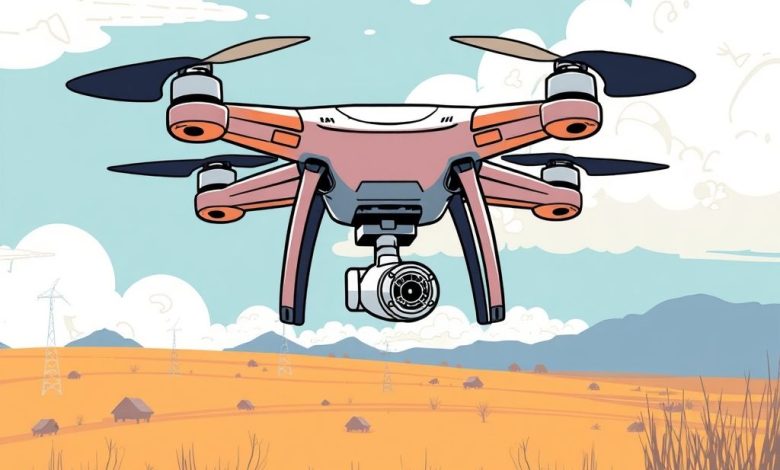Revolutionizing Field Service How Drone Integration Enhances Inspection Efficiency

Introduction
Field Service Management (FSM) is a crucial aspect of modern business operations, particularly in industries such as construction, utilities, and maintenance services. Traditionally, FSM relied heavily on manual processes and human inspections, which could be time-consuming, expensive, and prone to errors. However, technological advancements have introduced innovative solutions that are revolutionizing the way field service operations are managed. One such innovation is the integration of drones into field service management systems, specifically for inspection purposes.
This article explores the concept of combining Field Service Management with drone integration for inspections, highlighting its benefits, challenges, and future potential. We will examine how this technology is transforming the industry and what it means for field service managers.
The Evolution of Field Service Management
Field Service Management has come a long way since its inception. From paper-based scheduling systems to sophisticated software solutions, the industry has witnessed significant improvements in efficiency and productivity. Modern FSM systems typically include features such as:
- Scheduling and dispatching
- Resource allocation
- Work order management
- Customer relationship management
- Inventory tracking
- Reporting and analytics
These tools help businesses streamline their operations, reduce costs, and improve customer satisfaction. However, despite these advances, traditional methods of inspection still had limitations.
Limitations of Traditional Inspection Methods
Traditional inspection methods often rely on human inspectors who physically visit sites to assess conditions. While effective, these methods have several drawbacks:
- Time-consuming: Physical inspections require travel time, which can delay response times and increase operational costs.
- Expensive: Human inspectors need training, equipment, and compensation, making the process costly.
- Subjective: Human interpretation can lead to inconsistencies and potential errors.
- Limited scope: Inspectors may miss details due to physical constraints or time limitations.
Enter Drone Integration
Enter drone technology, which has been increasingly adopted across various industries for aerial inspections. When integrated with Field Service Management systems, drones offer numerous advantages:
- Cost-effectiveness: Drones significantly reduce operational costs by eliminating the need for human inspectors to travel to remote locations.
- Increased coverage: Drones can cover large areas quickly and efficiently, allowing for more thorough inspections.
- Real-time data capture: High-resolution images and videos provide immediate visual feedback.
- Enhanced safety: Drones can inspect dangerous or hard-to-reach areas without putting human lives at risk.
- Consistency: Automated data collection minimizes human error and ensures consistent results.
How Drone Integration Works in Field Service Management
The integration of drones with Field Service Management systems involves several key components:
- Data Collection: Drones equipped with high-resolution cameras and sensors fly over designated areas to collect data.
- Image Processing: Advanced algorithms analyze the collected data to identify anomalies, damage, or other issues.
- Integration Platform: A central platform combines drone data with existing FSM data, creating a comprehensive view of the inspection process.
- AI-Powered Analysis: Machine learning algorithms enhance the accuracy of analysis, flagging critical issues for immediate attention.
- Reporting and Visualization: User-friendly interfaces present findings in an easily digestible format for decision-makers.
Benefits for Field Service Managers
For field service managers, integrating drones into their operations offers numerous benefits:
- Improved Efficiency: Reduced travel time and increased coverage allow for more inspections per day.
- Enhanced Decision Making: Real-time data provides immediate insights for better decision-making.
- Cost Reduction: Lower operational costs translate directly to increased profitability.
- Increased Safety: Reduced human exposure to dangerous environments improves overall safety.
- Competitive Advantage: Early adoption of this technology sets businesses apart from competitors.
Challenges and Considerations
While drone integration offers significant advantages, there are several challenges that field service managers must consider:
- Regulatory Compliance: Ensuring adherence to local regulations regarding drone usage.
- Data Privacy: Protecting sensitive information captured during inspections.
- Training Requirements: Educating staff on drone operation and data interpretation.
- Infrastructure Costs: Initial investment in drones and necessary equipment.
- Maintenance and Repair: Ensuring drones remain operational and are easily repairable.
Future Outlook
The integration of drones with Field Service Management is an emerging technology with significant potential for growth. As the industry continues to evolve, we can expect:
- Improved AI capabilities for more accurate analysis.
- Increased adoption across various industries beyond construction and utilities.
- Integration with other technologies like IoT sensors for comprehensive site monitoring.
- Standardization of protocols for data collection and analysis.
- Further reduction in costs as technology advances.
Conclusion
The combination of Field Service Management and drone integration for inspections represents a significant leap forward in operational efficiency and effectiveness. By leveraging drone technology, field service managers can streamline their operations, reduce costs, enhance safety, and provide more accurate and comprehensive services to their clients.
As this technology continues to mature, it’s crucial for field service managers to stay informed about advancements and consider how drone integration can benefit their specific business operations. The future of field service management looks bright, with drones playing an increasingly important role in shaping the industry’s landscape.
By embracing this technology, businesses can position themselves at the forefront of innovation while improving their bottom line and customer satisfaction. As we move forward, one thing is clear: the days of traditional inspection methods are numbered, and the era of drone-assisted Field Service Management has begun.




